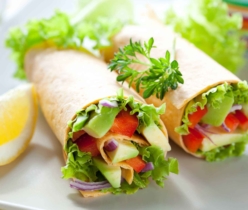Usually when it comes to weight loss, low-carb is the best way to go. A good low-carb diet will give you constant, steady blood sugar levels throughout the day. If you have steady blood sugar, you eat less (naturally reduce calories) and you bypass the insulin spike, fat gain mechanism. But that is definitely not the only reason. Some common reason low-carb may not be working for you are:
- You are not eating organic food.
Organic food has fewer pesticides. Organic meat is more important than organic vegetables. Toxins are stored in body fat, away from your internal organs, to keep your important organs safe. If you reduce the number of toxins ingested, by eating organic meat and vegetables, you will reduce the amount of fat stored.
- Your digestive system is screwed up.
If your digestive system is messed up, then your body will basically be producing toxins that will be stored as fat and you’ll be unable to effectively detoxify. Check out the book the GAPS diet by Natasha Campbell-Mcbride. It’s primarily about treating depression, anxiety, and many other ‘psychological’ disorders, but it’s a good reference for proper digestive health and how to restore it.
- Your physiology just isn’t equipped to handle a low-carb diet.
Everyone’s physiology is different. Some people just don’t do well eating a lot of meat, protein, and fat. These people need to eat more vegetables and even starchy foods. (WARNING: this does not mean eating piles of refined pasta and bread is ok!). If you want a really quick-and-easy guide to this, check out How to Eat, Move, and Be Healthy by Paul Chek. If you want to know the nuts-and-bolts about metabolic typing, read Biochemical Individuality by Roger Williams. Either way, try a vegetarian or low-meat diet and see if that helps you.
- You have been cutting calories
I’m not sure if you are cutting calories, but cutting calories can seriously hurt your metabolic health. Your body adapts to a certain caloric load through a process called adaptive thermogenesis. Cutting calories can slow down your metabolism and make it difficult to lose weight. There are tons of articles online about it if you want to know more but basically: don’t cut calories on purpose!
- Other tips
Make sure you are sleeping 8hrs/day and falling asleep by 1030.
If you are really stressed out, you will not lose weight. Go see a counselor or get a book on stress management and handle your stress
- You may have some other health problem
Go see a functional health practitioner or a holistic health practitioner. A conventional doctor may be able to help you, but I’ve never met one who knows a lot about weight loss.
Not restricting carbs enough. One of the things you’ll hear when you are researching low carb diets is that you should eat “less than 50g of carbs in a day.” Simple enough, but some people decide that they’ll eat 50g of carbs in one meal and they feel as if they’ve within what the diet allows.
Eating that many carbs at once can knock you out of ketosis. It’s even worse if you decide to eat carbs immediately after waking up, which is a time of great fat-burning potential.
What you should do is spread your limited carb intake throughout the day, perhaps 10g of carbs per meal. You should also limit your carb intake to 30g of carbs per day, which is just a safer bet for better fat loss. Try to get these carbs through healthy vegetables.
Eating protein without fat. As you probably know, carbs cause an insulin release, get burned instead of fat and knock you right out of ketosis. So you avoid eating them or keep them to a small number of carbs a day, spread throughout the day. Simple enough.
However, protein, when eaten alone, can do the same thing. Protein can raise insulin levels and slow ketosis, thereby slowing your fat burning potential.
What you need on a keto diet is to eat fat along with your protein. This will blunt or totally nullify the insulin release so you aren’t knocked out of ketosis. You should aim for half a gram of fat per gram of protein. So if you eat 50g of protein, eat at least 25g of fat along with it. Olive oil is an easy go-to when you need to get fat with your protein.
Don’t be afraid of fat at all while on a low carb diet. It will be your body’s main source of energy.
Not carb refeeding. Being on any diet can lower your leptin hormone, which is a vital hormone in weight loss. Being on a low carb diet, you may believe you should always avoid carbs, but this isn’t the case when it comes to keeping your leptin at optimal levels.
Every seven or so days you should indulge in those carbs of which you’ve been depriving yourself: bagels, white rice, pizza, burgers or anything of that sort. Don’t consume soda or junk food, though. Its nutritional value is too low. Again, this carb refeeds can help you keep your leptin levels up, which you need to lose weight consistently.




